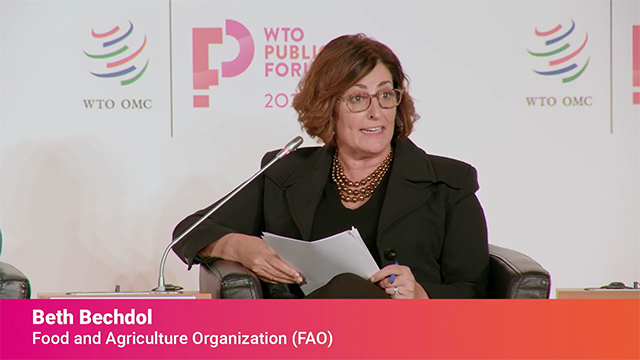Farmers around the world can be a catalyst for improved sustainability and reduction of greenhouse gas emissions, but they need financial and policy support, as well as a voice in policy, according to a Sept. 11 expert panel at the World Trade Organization (WTO) public forum.
The high-level representatives from the agriculture and trade sectors discussed “Sowing Inclusivity: Rethinking Agricultural Trade for All” as part of the Sept. 10-13 WTO Public Forum on “Re-globalization: Better Trade for a Better World.”
Panelists examined the urgent need for reforms in global agricultural trade to address growing inequality and the pressures of climate change and geopolitical disruptions.
They called for a reimagining of global trade policies that are more inclusive of farmers and innovative in addressing the dual challenges of food security and sustainability.
Climate change and geopolitics: A changing landscape
Panelists agreed on the profound impact of climate change and political instability on global agriculture. They differed, however, on the appropriate role and implementation of agricultural subsidies.
Inu Manak, Fellow for Trade Policy at the Council on Foreign Relations, argued that agricultural subsidies, while meant to support farmers, are largely going to the largest producers, creating significant trade distortions. “We should see what targeted support forms are needed and how we should allocate them,” she said.
Manak also stressed the importance of rethinking outdated agricultural subsidy policies.
“We can’t offer solutions based on 30-year-old norms,” she argued. “The question is, how do we find balance between subsidies and less trade-distorting measures?”
Other panelists questioned the politicization of subsidies.
“We are finding in too many discussions much more of politics about own national interests, rather than finding global compromises. I think we should just push harder for it. We have to become better spokespersons for farmers,” said Beth Bechdol, Deputy Director General of Food and Agriculture Organisation (FAO) of the United Nations.
To reduce national political interference, Bechdol and other panelists agreed that WTO should take a stronger lead in finding consensus around systemic thinking and governance in food and agriculture. This is especially true with 22 million people around the world struggling to get food on the table due to economic disruptions, they said.
The role of innovation and sustainability
“Food production must increase by 20% by 2030,” Bechdol said. She emphasized the need for innovation in agriculture to tackle hunger while addressing environmental concerns. According to Bechdol, farmers are facing the dual challenge of feeding the world and also minimizing agriculture’s carbon footprint, and it is a responsibility that should be shared with the government.
Agriculture needs to be understood as not simply a challenge, Bechdol said. In fact, through new technologies, such as improved crop genetics and better livestock management, farming can help promote sustainability and reduce CO2 emissions.
Further innovation in improved supply chain logistics to reduce food waste can make a big difference too.
“One-third of agricultural production is lost or wasted. We need to do better in terms of logistics and supply chains,” Bechdol said.
Advocating for farmer inclusion
Farmers’ voices were another area of focus for the panel. Andrea Porro, Secretary-General of the World Farmers Organization (WFO), expressed frustration with the lack of farmer representation in policy decisions. He said 2024 has seen waves of farmers’ protests, including in the EU, India, Australia and Africa.
“Farmers feel they aren’t listened to enough,” Porro said. He stressed that while farmers are economic actors, they are often excluded from the decision-making processes that directly affect their livelihoods.
“Without proper incentives, they feel like they are facing an insurmountable wall of obligations, costs, and geopolitical challenges all by themselves,” he said.
Public trust and support for farmers is important, and we need more predictable and stable policies that take into account the unique challenges of the agricultural sector, Porro said.
“Farmers are upset, not about the size of the subsidies and support, but about the modality of it,” he explained, stressing the need for a pragmatic approach to trade that ensures farmers are involved in crafting sustainable solutions.














